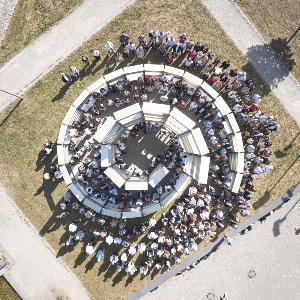Paul Klaeren has been swimming all his life. He started swimming competitively in the third grade - when some children didn't even have the „Seepferdchen“ yet. “It was something I did throughout my entire school career,” he says. He usually had his first training session before school started, sometimes up to eight sessions a week. He regularly took part in competitions and at times was one of the five best swimmers at the German age group championships.
Nevertheless, the Düsseldorf native always got really good grades at school and completed his Abitur with a 1.0. “But it wasn‘t always like that,” he emphasizes. It wasn't until the 10th grade that he realized he should take school a little more seriously. “My mother always attached great importance to doing well at school, because you definitely can't earn any money in swimming.” His parents brought talented swimmers into the world: his brother, who is three and a half years younger, is also a competitive swimmer.
After graduating from high school, the 18-year-old was convinced that he could only continue his swimming career in the USA. “That's what you were told as a teenager,” he recalls. So he went to Franklin College in Indiana, where he studied political economy, a mixture of politics and economics. There he also took part in the National Model United Nations, in which students take on the roles of delegates from the respective countries for the week-long conference in New York. He represented the interests of Tajikistan.
Things also went very well in the competitions; shortly after his arrival, he came out on top in the championship of twelve colleges. Nevertheless, Paul Klaeren became disillusioned in the second semester because he was able to learn and train less than he had hoped. “It was a great experience, but I'd had enough,” he says. So he moved back to Germany and switched to LMU to study economics - and to swim, of course.
24 hours training per week
Here, the 22-year-old trains at the Bavarian state base near the Olympic Park. Shortly after moving here, he was accepted into the Bavarian state team. Since then, he has taken part in top competitions such as the World Cup, the German Short Course Championships and the 1st Bundesliga. He now competes again for his home club in Düsseldorf in the 2nd Bundesliga. His personal training includes ten sessions in the water and two in the gym every week, which means a total of around 24 hours of training.
At the same time, his studies are also going well. “I was completely lost at first,” says the LMU student with a grin. But economics was the right choice. No one will doubt that after he was accepted into the Honors and Econnect program as one of the best students in his year. “Through personal mentoring from the professors and the workshops with the companies, you get a good feeling of what you can do and work with economics.”
Despite the heavy training and study workload, Paul Klaeren continues to volunteer, as he did in his home town. “I've always really enjoyed helping children with their swimming lessons,” he emphasizes. He knows from his own experience how large the swimming groups are and how grateful the instructors are for a helping hand. “As a result,” he adds, “I can also pass on the experience I have gained in competitive sport to newcomers.”
The 22-year-old is very grateful for the Deutschlandstipendium. Without the financial support, he would never have been accepted into the support program of the economics faculty and would never have been accepted into the national team. “I would never have been able to have all these experiences without the help of the scholarship and without restricting my family financially,” he explains. It was very important to him from the outset to finance his own life. He didn't want his parents and younger brother to suffer because he couldn't go to work due to his dream of swimming and studying.
Little time left for partying
The question remains: what does someone with such a busy training schedule do when his fellow students go out on the weekend? “Of course sport means a lot of sacrifices,” he admits. The day is packed and free time is rare. At the same time, however, he is passionate about both his studies and his sport, so it's not difficult for him. And if you're celebrating someone's birthday, he's still there until 3 or 4 in the morning. “I can get up and swim even after two hours of sleep,” he says and laughs. “That's how I grew up.”

